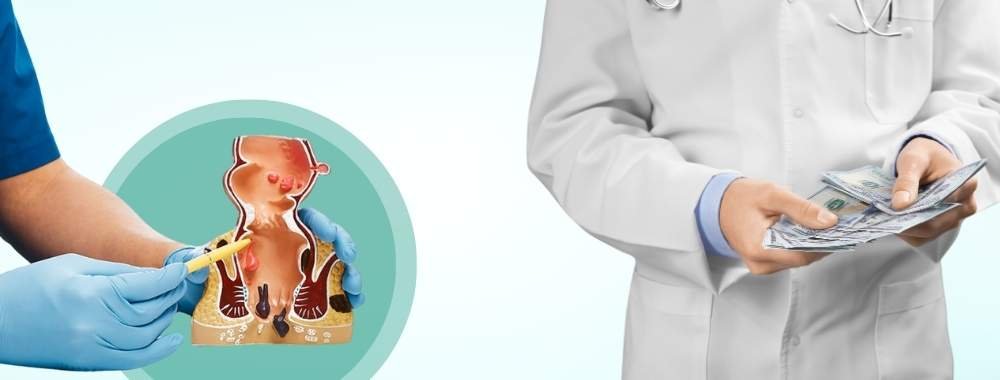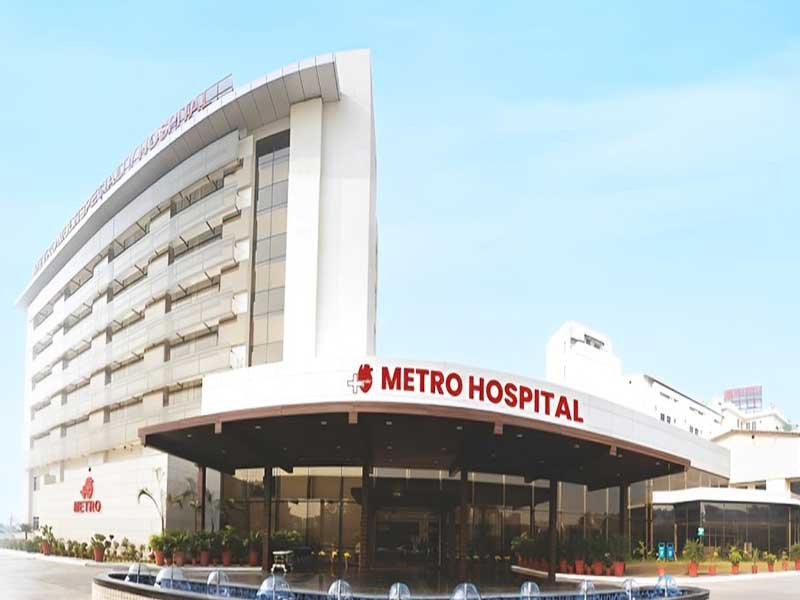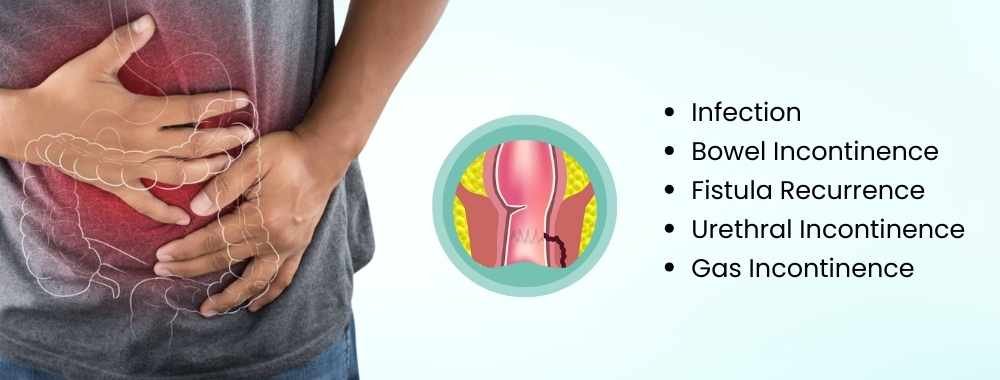Receive quality fistula surgery in India, where skilled surgeons offer safe and effective procedures. Access affordable healthcare without compromising on excellence.
Recovery Time
2 week
Success Rate
98%
Hospital Stay
1 Days
Treatment Type
Surgical
Home Treatments General Surgery Fistula Surgery
Are you trying to find an affordable option for fistula surgery? Well, the cost of fistula surgery in India is 2200 US dollars, which is less compared to Western countries.
Let’s take a moment to understand what fistula surgery is!
Fistula surgery, also called fistulotomy, is a procedure designed to help people by treating an abnormal connection between two parts of the body. The surgery involves making an incision to remove part of the fistula, which helps eliminate infection and drain any infected tissue.
If you're considering treatment for this condition, choosing to have your surgery in India can be a smart choice.
The country offers affordable prices, skilled doctors with plenty of experience, and advanced medical technology that helps ensure successful treatment outcomes for patients.
A fistula-in-ano is a small tunnel that forms between the skin around the anus and the inside of the anal canal. This condition often develops as a result of an infection that begins in a gland near the anus and spreads to the surrounding area.
Fistula surgery cost in India is affordable compared to other Western countries, which include overall surgical cost, diagnostic tests, rehabilitation, and physiotherapy (if necessary), etc. Now, here is the list of cost breakdown:
Cost Component | Details | Cost in USD |
Pre-operative Consultation & Diagnosis | Consultations, X-rays, MRI scans, blood tests | 250 USD |
Surgery Costs | Includes surgeon fees, type of surgery, and hospital stay | 2200 USD |
Rehabilitation and Follow-up | Physiotherapy sessions, medications, supportive devices, and follow-up visits | Variable by Procedure |

• Doctor expertise
The type of doctor you choose affects the overall cost of the treatment because highly experienced doctors charge higher fees due to their expertise.
• Type of anal fistula
The type of fistula also affects the cost, because each type has different challenges and circumstances, and may require additional treatment, which may affect the cost.
• Type and Complexity of Surgery
The type of surgery and how complicated it is can affect the cost. More complex procedures need specialists and are usually more expensive.
• Type of Hospital
The hospital you choose matters, too. Private hospitals are generally more expensive than government ones, and better facilities and equipment can raise the cost.
• Pre and post-surgical medicines
Medications such as painkillers, analgesics, corticosteroids, antibodies, etc, are prescribed by the doctor before and after surgery, which may increase the cost of the surgery.
• Stay in the hospital.
Hospital stay can also affect the cost of the treatment because the longer you stay in the hospital, and the type of room you choose, can increase the cost.
Fistula Surgery cost
Treatment Name
Estimated Cost
Fistula Surgery 1800-2500 USD
Country | Cost Structure |
India | 1800 to 2500 USD |
United States | 15000-20000 USD |
Germany | 8000-10000 USD |
Turkey | 2200-5000 USD |
Key Takeaways
✅ Affordable Treatment Cost
India offers cost-effective treatment solutions for international patients seeking fistula surgery in India, where surgery costs are affordable compared to Western countries, and you can save up to 40%.
✅ Advanced Medical Treatment
India provides advanced medical care and the latest technologies for fistula surgery. Many of its hospitals are internationally accredited by JCI and NABH, demonstrating a strong dedication to quality patient care.
India has some of the best surgeons who specialise in fistula surgeries, ensuring successful results for patients.
Hospitals in India use modern technologies like the advanced flap Procedure, LIFT Procedure, and Endoscopic Ablation. These help make the surgery more precise and effective.
Many hospitals in India are approved by international organisations like JCI and NABH, which means they follow high standards for patient care and safety.
Hospitals in India provide full care before and after surgery, including thorough check-ups, personalised treatment plans, and regular follow-ups to ensure proper healing.
This condition affects the area around the anus and is fairly common, occurring more often in men than in women. Interestingly, around half of the people with this issue may develop an infection in the anal glands, which can lead to the formation of small tunnels called fistulas.
There are several types of fistulas, which include:
• Anal Fistula
This is the most common type of fistula, which is an abnormal connection that forms a tunnel between the anal canal and the skin around the anus. However this tunnel is an result of an infection or inflammation in the anal or rectal area, yet it can be painful and causes discomfort, irritation, and discharge of pus or blood.
• Vesicovaginal Fistula
Its an abnormal opening between the bladder and the vaginal wall which cause urine to leak from vagina, and it leads to various symptoms like wetness, odor, and discomfort.
• Rectovaginal Fistula
It’s an abnormal connection between the rectum and vagina which allow for the passage of stool and gas into the vagina. However, it can cause a variety of symptoms such as foul-smelling discharge, vaginal infections, and pain during intercourse.
• Enterocutaneous Fistula
It’s an abnormal connection between the gastrointestinal tract and the skin that causes intestinal contents to leak onto the skin surface. However, it often occurs as a complication of surgery or trauma, but it can also arise from other causes such as inflammatory bowel disease or malignancy.
Fill in your details and we'll get back to you soonGet Free Treatment Quote
Fistula usually develops from some injuries or inflammation inside the body. However, inflammation can cause ulcers to form, which may expand to reach another surface inside the body.
Here are some common causes of fistulas:
A fistula surgery is performed to treat the fistula (an abnormal passageway or opening that connects two organs or an organ to the body's surface) and drain the abscess caused by Crohn's disease.
Surgery helps to seal the fistula while avoiding damage to the muscles, a ring of muscles that open, and close the anus and it is also responsible for bowel control.
Here is the list of patients who need fistula surgery:
Beds: 539
New Delhi
Beds: 230
New Delhi
Beds: 710
New Delhi
Beds: 650
New Delhi
Beds: 191
New Delhi
Beds: 310
New Delhi
Beds: 330
Gurugram
Beds: 380
New Delhi
Beds: 402
New Delhi
Beds: 1300+
Gurugram
Beds: 1000
New Delhi
Beds: 450
Faridabad
Beds: 675
New Delhi
Beds: 500
New Delhi
Beds: 400+
Faridabad

Max Super Speciality Hospital, Saket

Aakash Healthcare Super Speciality Hospital

Indraprastha Apollo Hospital

BLK Max Super Speciality Hospital

Dharamshila Narayana Superspeciality Hospital

Fortis Escorts Heart Institute

Fortis Memorial Research Institute

Manipal Hospital Dwarka

Max Super Speciality Hospital Shalimar Bagh

Medanta - The Medicity Hospital

Moolchand Kharaiti Ram Hospital

Sarvodaya Hospital

Sir Ganga Ram Hospital

Venkateshwar Hospital

Metro Heart Institute with Multispecialty
Tests | Description |
Physical exam | A rectal exam is important for diagnosing a fistula. This includes checking the skin around the anus, performing a digital rectal exam (using a finger to feel inside the rectum), and using an anoscope to look inside the anal canal. |
Imaging Tests | MRI: This test creates detailed images of the pelvic floor and sphincter muscles to help identify the fistula. Endoscopic Ultrasound: Sound waves are used to find the fistula and check the surrounding tissues, including the sphincter muscles. Fistulography: An X-ray is taken after injecting contrast dye to highlight the fistula tunnel. CT Scan: This scan provides more detailed images than a regular X-ray, helping to locate the fistula and identify its cause. |
🟢 Dos
🔴 Don'ts

Recent advancements in fistula treatment in India offer various surgical options, including the advancement of flap procedures, LIFT procedures, endoscopic ablation, laser surgery, etc. The advancement flap is used to avoid cutting the anal sphincter muscles, while the LIFT procedure seals and flattens the fistula.
Endoscopic ablation uses an electrode to seal the fistula via an endoscope, and laser surgery employs a laser to close the fistula, offering new possibilities with minimal safety concerns.
List of Advancements in Fistula Surgery:
This technique involves cutting or scraping out the fistula and covering the entry hole with a tissue flap from inside the rectum, the final part of the bowel.
Ligation of the intersphincteric fistula tract (LIFT) is used for fistulas passing through the anal sphincter muscles, providing a safer alternative to fistulotomy.
This minimally invasive procedure uses an electrode passed through an endoscope to seal the fistula effectively, with no significant safety concerns.
A laser beam is used to seal the fistula. While there are some uncertainties about its long-term effectiveness, the procedure has no major safety concerns.
Its a most commonly performed procedure that help to treat anal fistulas which involve making an incision along the fistula to remove it, especially when the sphincter muscles cannot by bypassed.
It's an alternative to fistulectomy, which reduces the risk of incontinence. Additionally, this technique involves placing a cotton pellet or a silk thread through the fistula across the sphincter muscles.
This technique involves using a part of the healthy tissue and covering it at the fistula hole to promote growth.
This process usually leads to a smooth and even healing, effectively addressing openings that may involve the muscle responsible for controlling bowel movements.
In this method, a small tube-like opening in the body, called a fistula, is closed off using a special tool and a camera. This technique helps ensure that the opening is properly sealed and can heal effectively.
The surgery usually takes about 30 minutes, depending on the type of fistula. Here’s a breakdown of what happens before, during, and after the procedure:
• Before the Surgery
In some cases, patients don’t need to stay overnight in the hospital and can go home the same day.
If the fistula is small or shallow, local anesthesia is used to numb the area. For larger or deeper fistulas, general anesthesia will be given to put you to sleep.
You’ll need to sign a consent form before the surgery.
An IV line will be inserted into a vein to give medications and fluids.
Before the procedure, you’ll meet with the anesthesiologist to discuss any allergies you might have.
• During the Procedure
You’ll receive either general anesthesia, which puts you to sleep, or sedation to keep you calm. For small fistulas near the surface, only local anesthesia is needed.
Antibiotics will be given through the IV to help with healing. Your position during surgery will depend on the location of the fistula and might include:
The surgeon will open the fistula and use an anal retractor to access the area. The fistula will be surgically removed.
The wound will be cleaned and left open to heal naturally.
• After the Surgery
After surgery, you’ll be taken to the recovery room where you’ll be monitored until you wake up.
You may feel some pain and discomfort in your lower abdomen, even with local anesthesia.
Before going home, you’ll receive instructions on caring for yourself, including taking painkillers and antibiotics, using sanitary pads or diapers, and following wound care instructions.
Yes, many people can resume their normal activities within a day or two after fistula surgery, however, you may experience some pain and drainage from the wound, but it will subside with time. Yet you need to avoid heavy lifting for weeks following the surgery.

Complications | Description |
Infection | Infections are rare but can happen. To prevent them, antibiotics may be given, and in more severe cases, hospitalisation might be needed. |
Bowel Incontinence | Some patients may have trouble holding gas or experience faecal leakage after surgery. |
Fistula Recurrence | In some cases, the fistula can return after surgery, possibly due to chronic conditions or the surgical technique used. |
Urethral Incontinence | Some patients may experience urine leakage after the removal of a Foley catheter. |
Gas Incontinence: | If the sphincter muscle is affected during surgery, the patient may lose the ability to control gas. |
After fistula surgery, patients typically stay in the hospital for about 2 days. During this time, doctors monitor the healing process and address any complications that may arise. However, the length of the stay can vary based on the patient’s condition and recovery.
Recovery time after fistula surgery is usually about one week. Some discomfort may be experienced, but most patients can return to their normal activities soon after.
The success rate of fistula surgery is very high, around 99%, due to the expertise of skilled surgeons and the use of advanced surgical techniques.
‣ Team of Top General Surgeons:
We recommend the best doctors with more than 20 years of experience.
‣ JCI/NABH Accredited Hospitals:
We have also partnered with hospitals that have State-of-the-art Facilities that are equipped with the latest technologies, such as robotics, machine learning, and cutting-edge diagnostic and therapeutic equipment, designed to offer you comprehensive and personalised care.
‣ Other Benefits:
We provide swift and detailed responses, accurate cost estimates, help with obtaining medical visas, accommodation in India, and priority appointment scheduling with the doctors.
Moreover, we will facilitate your smooth arrival in India, with airport pickup, drop-off at the hotel, hospitalisation assistance, and much more.
While there are many surgical treatments available, a fistula is rarely permanent, but in some cases, diagnosing, treating, and recovering from a fistula can be slow and frustrating, so support is available for them to go through this experience. Patients undergo tests to diagnose the fistula, and when the results are out, doctors will decide the best course of treatment.
Disclaimer
The information available in this article about the fistula surgery is for a general overview for our audiences, and this information does not intend to provide an accurate cost estimate or other information. so, if you would like to get a professional opinion on it to get an estimated cost and clear your doubts about the procedure, then we are here to help you every step of the way. Connect with Mejocare now

Medically Reviewed By
QualificationsMBBS, DTMU University, Georgia.Radiation Oncology Resident at Burdwan Medical College and HospitalDr. Aryan Malhotra is a skilled and caring doctor. He is a Radiation Oncology Resident at Burdwan Medical College and Hospital. He treats people with cancer and works closely with patients during their treatment.He completed his MBBS from David Tvildiani Medical University in Georgia. He has passed the USMLE... Read More
Registration Number: 95565
Qualification: MBBS, MD from DTMU University, Georgia, Radiation Oncology Resident at Burdwan Medical College and Hospital
The average cost of Fistula Surgery in India is between 1800-2500 USD.
The success rate of Fistula Surgery in India is around 99%.
You need to stay at least a day in the hospital after Fistula surgery.
The recovery time for fistula surgery in India typically ranges from one to two weeks for patients to resume their regular activities and jobs. However, complete healing of the fistula may take several weeks, with the duration influenced by the size of the fistula and the extent of the surgical procedure.
Yes, there are potential risks associated with fistula surgery in India, including aneurysm formation, infections, stenosis, thrombosis, bleeding, chronic heart failure, fistula recurrence, ischemia, and polyneuropathy with ischemia.
Fistula Exercise: Hold a soft ball in the hand on the side of your fistula, Squeeze the ball 10-15 times per minute for 1-2 minutes, and Repeat this exercise 10-20 times a day.
Yes, it is necessary to have a companion.
Due to the possibility of bleeding after having polyps removed, you might be unable to travel domestically for two days or internationally for two weeks following your treatment.
Yes, you can do your own research and choose your therapist.
Paracetamol can be used regularly to control mild to moderate pain. Non-steroidal anti-inflammatory drugs (NSAIDs) such as diclofenac or ibuprofen can be used to control moderate pain.
Yes, insurance will cover the cost of Fistula Surgery in India.
To discover the top doctors or hospitals in India, you can visit our website, mejocare on the doctors' page, you can filter and find the finest doctors, while on the hospital page, you can identify the best hospitals. Additionally, you can reach out to us, and we will gladly offer you all the necessary suggestions and information you need.
The operation usually takes 15-30 minutes.
No, there is no waiting list for Fistula Surgery in India.
You must empty (clean out) your colon before a colonoscopy. To gain a clear view of your colon and rectum during the exam, there shouldn't be any residue in your colon. Your doctor can advise you to consume a particular diet the day before the exam to empty your colon.
Although you won't be totally unconscious, you'll probably forget the process because you'll be sleeping through it. Propofol is a medicine that is not an opioid but is frequently used for profound sedation. It is safe for the majority of patients, acts rapidly, and wears off swiftly.
After Fistula Surgery, constipation, a common side effect of opioids, can be managed with specific foods. Foods to avoid include high-fat dairy, processed foods, red meat, dried fruits, and sugary items. Opt for a balanced diet with fiber-rich options to ease constipation.
Aftercare services offered by the hospital include monitoring vitals, wound care, management of post-operative complications, rehabilitation services, and follow-up care.
Our care team can help you.
